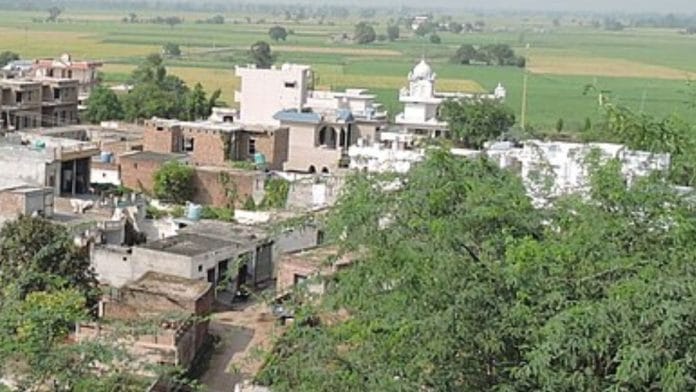New Delhi: A little less than a week after the Punjab and Haryana High Court put the brakes on the Land Pooling Policy 2025 by staying its implementation effectively, the Aam Aadmi Party-led Punjab government Monday closed curtains on the policy by withdrawing its implementation.
On 7 August this year, the Punjab and Haryana High Court noted that the state government notified the Land Pooling Policy 2025 through which it planned to acquire over tens of thousands of fertile acres for “proposed development work” in quite a haste. The government, the court said, had not addressed the concerns over the environmental and social impacts of the policy.
“We are prima facie also of the view that the policy appears to have been notified, in haste, and all concerns, including social impact assessment, environmental impact assessment, timelines, and redressal grievance mechanism, should have been addressed at the very outset in the policy, before its notification,” a two-judge bench of justices Anupinder Singh Grewal and Deepak Manchanda ruled.
The division bench then fixed the next date of hearing of the case as 10 September.
The state government, however, has already withdrawn the contentious policy.
“Government hereby withdraws the Land Pooling Policy dated 14.05. 2025, and its subsequent amendments. Consequently, all actions such as the LOIs (letters of intent) issued, registrations done, or any other action taken thereunder shall be reversed, henceforth,” a press note signed by the principal secretary at the housing & urban development department of Punjab said Monday.
What was the land pooling policy?
On 14 May, the Punjab government introduced the Land Pooling Policy 2025 in a notification. Under the policy, 26,000 acres of land in the Ludhiana district were notified for residential and commercial projects.
On 4 June this year, the Punjab government reiterated that the policy was an initiative in the interest of the public, as well as “for the welfare of land owners”. Its aim included checking land mafia activities to ensure profits directly reach farmers, the government said.
The government notified the policy under the Right to Fair Compensation and Transparency in Land Acquisition, Rehabilitation, and Resettlement Act, 2013. The Greater Ludhiana Area Development Authority subsequently said that it would obtain more than 26,000 acres of agricultural land in the Ludhiana district via “voluntary acquisition”.
Claiming it is committed to creating “well-planned urban estates that meet the needs of [a] growing population by consolidating fragmented land parcels and ensuring equitable and sustainable development”, the Punjab government said that the policy would boost planned urban development, as well as make landowners the stakeholders in urban development projects, thus allowing them to reap the benefits of such development.
However, shortly after notification, the policy faced intense criticism from farmers and small landowners in Punjab.
Also Read: Delhi Police lodges FIR against animal rights activists after India Gate protest
Why was the policy challenged?
On 4 June this year, the government notified the land pooling policy, and shortly after, Gurdeep Singh Gill, a resident of Phagla village who had received six acres from his father, challenged the policy in the Punjab & Haryana High Court.
His father received the land after his cross-border displacement—from Lyallpur in Pakistan to India. Gill argued in his plea that he and his family went on to invest in the land, eventually turning it fertile. Despite that, his land fell under the land pooling policy, he said.
Not just that, the government notified such a policy without conducting the necessary environmental and social impact assessments—essential prerequisites for the acquisition of land under Sections 4 to 8 of the 2013 Act—Gill’s plea contended. Even assessing whether setting up more residential and commercial complexes would serve the “public purpose” could not be shown, despite the 2013 law mandating it.
A large number of public and private housing or commercial projects in Ludhiana are already underway and are more than adequate to meet the existing and future needs of the public, Gill argued, labelling the policy as arbitrary and wholly irrational.
Gill pointed out that there was no provision for providing compensation once land acquisition had taken place, barring the payment of an “annual livelihood allowance of 50,000 rupees per acre”.
Terming this compensation as “too meagre” to sustain the families of small and marginal farmers, who would be adversely affected by the policy, Gill challenged it before the Punjab & Haryana HC.
Why did the court pause it?
In the 7 August order, the court cited the haste with which the government passed the policy and the ignorance about its social and environmental impacts and associated concerns as among the reasons for its stay order.
Besides this, the policy should have incorporated timelines for the land acquisition process, along with a grievance-redressal mechanism, at the very outset, even before the government notified it, the court said.
Staying the policy implementation by way of an interim order, the court said that a large number of landowners and others did not own the land themselves. This included landless labourers, artisans, MGNREGA workers, and those with other occupations in the villages, but they depended on the land for their livelihood.
The court also noted the lack of any provision for resettlement and rehabilitation of affected persons under the land pooling policy.
Finally, the court noted that the government takeover of tens of thousands of acres of fertile land in Punjab for its proposed development work happened ahead of any Social Impact Assessment or Environmental Impact Assessment studies.
Although the state government said it would conduct the assessment at a later date, when it would have the “definite information about the number of land owners who have opted for the scheme”, the court recalled the Supreme Court’s 2023 ruling in the Residents’ Welfare Association vs. Union Territory of Chandigarh case. The SC, at the time, said that before permitting urban development, the state government should conduct an environmental impact assessment.
(Edited by Madhurita Goswami)






